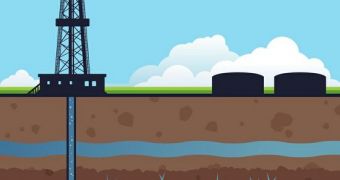The US Coast Guard has proposed that shale gas companies be allowed to transport fracking water across the country by barge. If approved, the policy suggested by the Coast Guard would lead to tons of contaminated water sailing up and down national rivers and lakes.
Strictly from a financial standpoint, the proposal does make sense. Thus, companies that are in the business of transporting fracking wastewater would certainly spend less money were they to use barges instead of trains or trucks.
“Waterways are the least costly way of transporting it. We look forward to being able to get the trucks off the highways as quickly as possible,” says James McCarville with the Port of Pittsburgh Commission, as cited by RSN.
As was to be expected, environmentalists were anything but happy to hear about the Coast Guard's plans for the country's waterways, especially given the fact that wastewater resulting from hydraulic fracturing is not exactly clean.
On the contrary, fracking wastewater is bound to contain both man-made chemicals, and naturally occurring heavy metals and radiation, specialists explain. Hence the fact that greenheads would much prefer it if the US Coast Guard's proposal were not given the green light.
“If and when there-s a spill, that can't be cleaned up. That means it-s going to be in the drinking-water supply of millions of people,” argues Professor Benjamin Stout with the Wheeling Jesuit University.
Besides, threats to the environment are expected to be all the greater given the fact that, when compared to run-off-the-mill trucks, barges can transport much more wastewater from hydraulic fracturing.
“You increase the volume and you increase the risk of a spill, which would be catastrophic for the environment, for human health, for first responders. And what are we getting from taking that risk? What are we accomplishing?” asks Kate Hudson with clean water advocate group Riverkeeper, as cited by WRVO.
The Coast Guard reassures that no gas shale company would be allowed to transport wastewater by barges before testing it for radioactivity levels, pH and various hazardous materials.
What's more, the barges themselves would be carefully inspected every once in a while, just to make sure that there has been no accumulation of hazardous materials that might affect workers.
The proposed policy for this project was made public on Wednesday. Members of the public have 30 days to comment.

 14 DAY TRIAL //
14 DAY TRIAL //